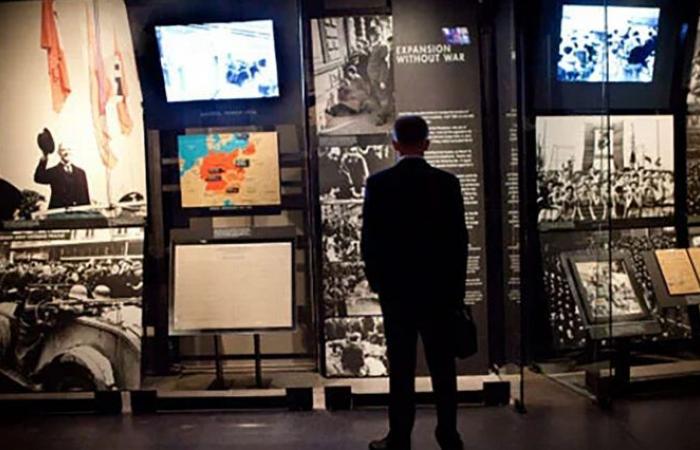When Donald Trump abruptly fired Doug Emhoff and other Biden appointees from the United States Holocaust Memorial Council, it wasn’t just a petty political maneuver — it was a warning flare about how empire behaves when it fears truth-tellers.
This is not simply about museum board politics; this is about control of national memory and who gets to define justice. And in that way, it directly mirrors the power dynamics of our judicial system, which long has operated as a tool of empire, cloaked in the language of law and order.
Nicole Wiesen
The U.S. Holocaust Memorial Museum stands as a testament to the consequences of unchecked state power, of a society that codified genocide and named it justice. It is an institution meant to remind us that silence in the face of rising fascism is complicity. And yet, on the 80th anniversary of the liberation of Dachau, a president who has repeatedly cozied up to white nationalism and authoritarian rhetoric chose to remove those actively working to combat antisemitism.
That’s no accident. It’s a playbook.
Empires, by nature, demand allegiance to hierarchy. They thrive by erasing dissent and rewriting memory. In the courtroom, that erasure looks like Black and brown defendants sentenced more harshly, their lives deemed disposable by the very system meant to protect them. It looks like prosecutorial misconduct that hides evidence, judicial systems that resist reform, and mass incarceration that disproportionately targets the poor. Our judicial system, like all arms of empire, always has been more invested in preserving control than pursuing truth.
This purge from the Holocaust Memorial Council is part of a broader pattern — one that weaponizes nationalism and nostalgia to maintain cultural dominance. By firing board members under the guise of “restoring support for Israel,” the administration isn’t preserving Holocaust memory — it is hijacking it.
“They are turning remembrance into retribution.”
They are turning remembrance into retribution, and memory into a political pawn.
This distortion is not new. White Christian nationalism has long manipulated religious symbols and sacred history to sanctify state violence. Just as Rome executed Jesus under the pretense of order, modern-day empires sanitize their injustices with legal justification. And just like the Roman cross, the death penalty today remains a public symbol of who holds power over life and death.
Trump’s reshaping of cultural institutions follows the same logic as mandatory minimums, three-strikes laws and capital punishment: it consolidates authority, punishes perceived enemies and rebrands domination as righteousness. In this way, our judicial system doesn’t just mirror empire — it is its enforcement arm.
But what’s particularly dangerous about this moment is how it undermines the power of narrative. The Holocaust Museum exists not just to remember but to warn. When its leadership is stripped of those committed to fighting modern antisemitism, white supremacy and hate, that warning is blunted. The very act of historical remembrance becomes politicized, and the cautionary tale of state-sponsored atrocity is neutered.
This move also reveals how fragile the empire truly is.
“It’s about reshaping who gets to tell the story of justice in America.”
If memory — if truth — were not a threat, it would not need to be silenced. If justice truly were the goal, the system would not need to rig itself to maintain impunity. But the judicial empire, like all empires, is terrified of liberation. It is afraid of what might happen if we saw the full humanity of those it cages, the families it fractures, and the histories it tries to erase.
We must name this for what it is: not just a political reshuffling, but a form of narrative violence. The firing of Emhoff and others is not merely about reshaping boards — it’s about reshaping who gets to tell the story of justice in America.
And when the story is controlled by those in power, the conclusion always is the same: empire wins.
But we know a different story is possible. We know, from the very memory of the Holocaust, that silence is not neutrality, it is betrayal. We know, from our communities and courtrooms, that the law is not inherently just but it is a tool that reflects the values of those who wield it.
If we are serious about remembering the Holocaust, then we must also be serious about resisting its repetition in new forms: in cages and death chambers, in courtrooms that sentence the poor while excusing the powerful. Justice is not empire’s priority. Control is. But we, the people, still have the power to remember rightly, to disrupt narratives of domination and to demand that our systems reflect the dignity of every human life.
Because justice — true justice — does not come from the throne of Caesar. It comes from the conviction that no one is beyond redemption and no story is too dangerous to tell.
Nicole Wiesen serves as director of communications for Georgians for Alternatives to the Death Penalty and is a Public Voices Fellow on racial justice in early childhood with the OpEd Project in partnership with the National Black Child Development Institute. She advocates for advancing mental health resources for previously incarcerated individuals








